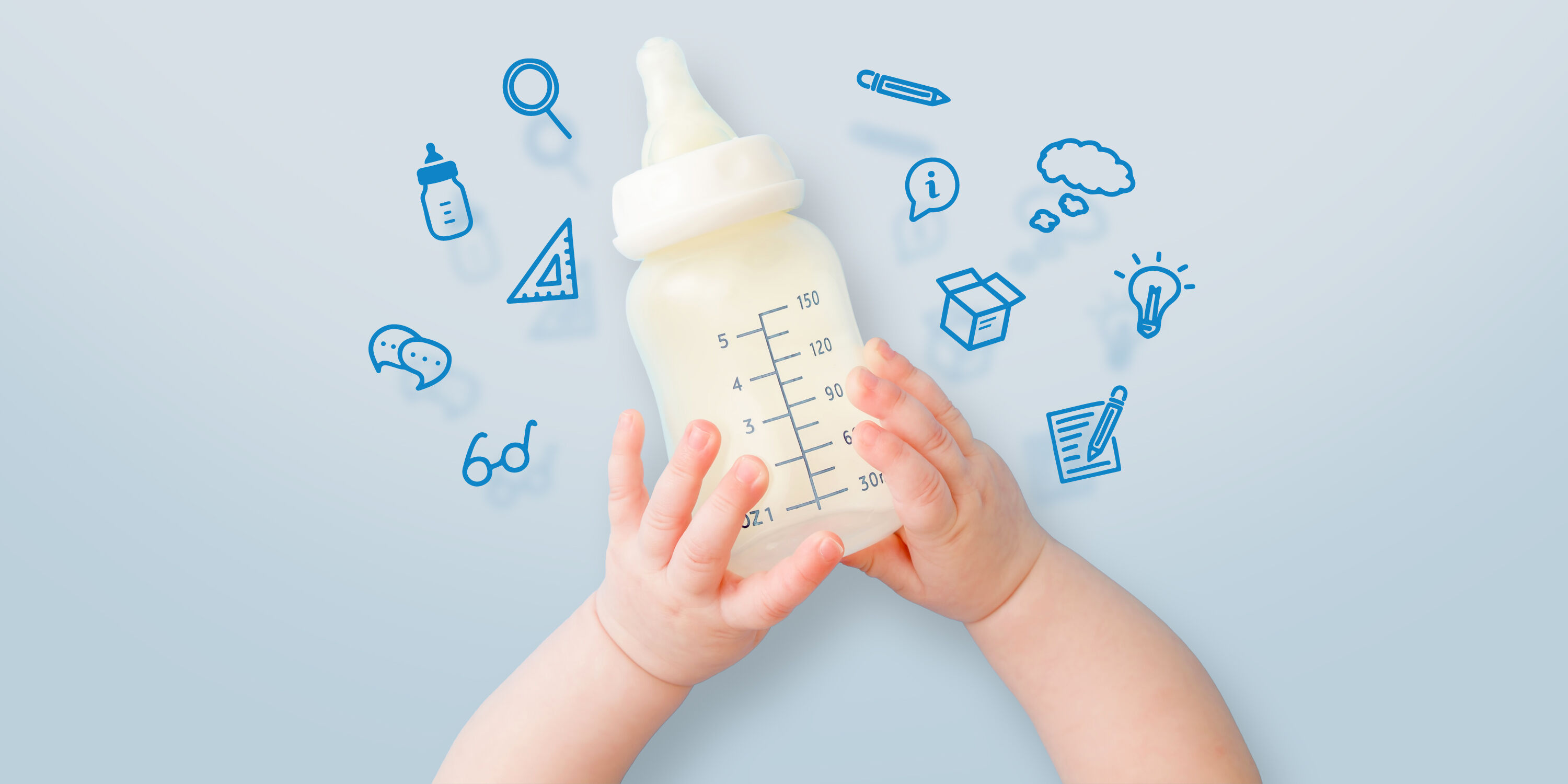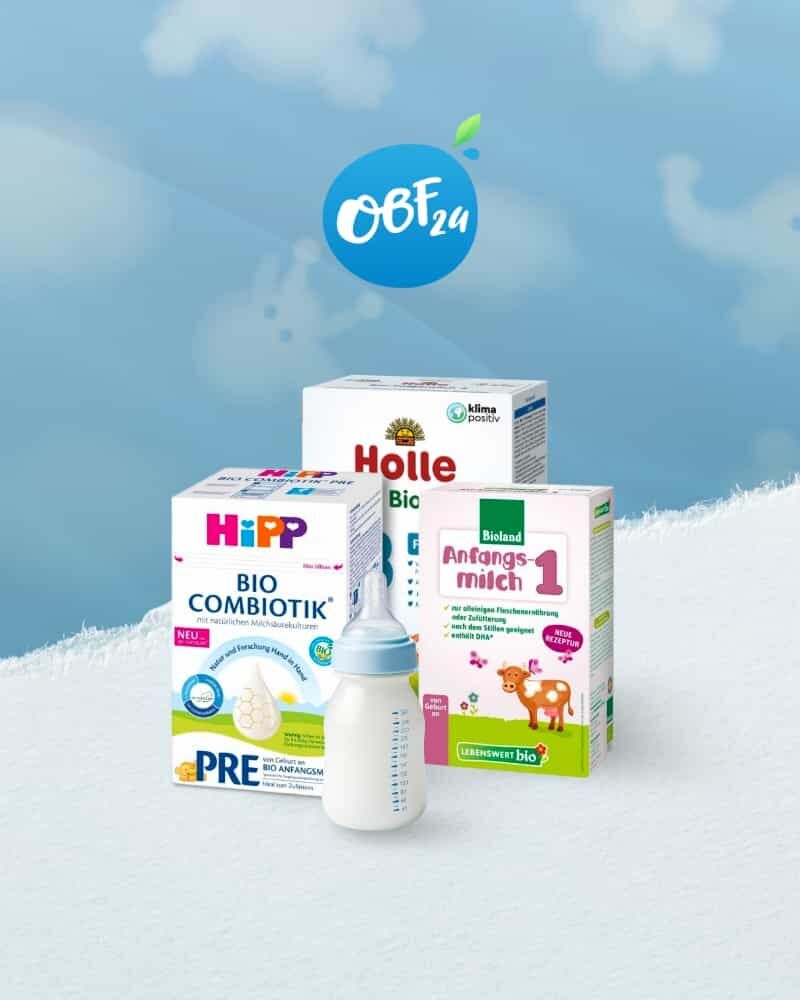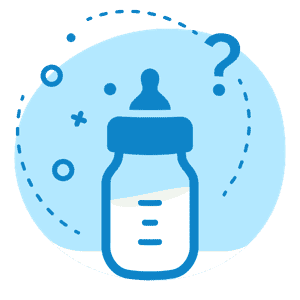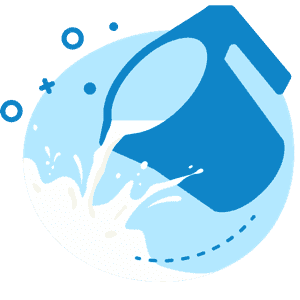💭 FAQ


HAVE A QUESTION?
No worries! Check the list below for answers to our most commonly asked questions. If what you’re looking for isn’t there, send us a message.
A parent's formula-feeding journey is so personal, unique, and can be challenging. We at OBF24 are proud to have a team that can help guide you along the way.
We should probably start with the lead: Holle makes Lebenswelt. Holle introduced Lebenswert as a less expensive but high-quality organic baby formula option for parents.
The major difference between the two brands is that Lebenswert takes responsible farming and practice to a new level. More than just being organic, the Lebenswert brand is also a biodynamically certified company. This means that they use methods that are better for the land, the plants, and the animals, than even organic farming.
Both HiPP and Holle are certified organic by the European Commission. This is part of the EU government that's tasked with guarding the safety and purity of foods, drugs, and other things in the EU.
Holle formulas are also Demeter Biodynamic Certified, a certification for biodynamic farming. This is a more in-depth certification that considers animal welfare, biodiversity, ecosystem preservation, and more.
Comparing Loulouka and HiPP Formula is a study in more similarities than differences. Both are organic and formulated according to the EU’s extremely high standards. In addition, both companies adhere to strict farming practices to ensure that everything in their formulas is top quality.
Use our comparison chart to understand the differences between the best Organic Baby Formulas from Europe across the most important categories.
You're busy, so rather than a long, drawn-out post on the best baby organic baby formulas, we're going to make it short and easy:
LEBENSWERT ORGANIC STAGE 1 - is specifically formulated for babies under six months old. Since infants often spend most of their time sleeping at that age, stage 1 is less calorie-dense than later stages. It's designed to have the complete nutrition that a baby needs to grow big and strong.
LOULOUKA STAGE 1 - A relative newcomer to making formula, Loulouka has done a great job creating unique, organic baby formulas. Their formulas contain no palm oil, opting for coconut oil instead.
HOLLE GOAT MILK STAGE 2 - If your baby has had a tough time digesting cow's milk, the Holle Goat Stage 2 is an excellent choice. Made from sustainable, organic ingredients and without sucrose or GMO ingredients, this is a well-rounded formula, even if the baby likes it better.
HIPP COMBIOTIC STAGE 2 - With its simple list of ingredients, this formula for 6 - 12 months old is perfectly balanced to help babies grow well. This is the right choice if you're transitioning from breastmilk to formula; it's designed to mimic breast milk at this stage, so your baby doesn't miss any of his nutrition.
Note that it can be important to stick with one brand of formula. For example, if you start your baby on Loulouka 1, it's usually easier to continue with that brand rather than switch around. If, however, your baby isn't eating well, is not tolerating the formula well, or is outgrowing formulas too fast, it might be worth switching to see if a different brand works better.
The nutrient composition of European formulas is close to breast milk, and they exclude some ingredients, like corn syrup and guar gum, that just aren't helpful in a baby's first food. Clean, nutritious, and organic formulas like HiPP, Loulouka, Holle, and Lebenswert have been enjoyed by countless babies in Europe, the United States, Canada, and around the world.
US baby formula brands are, for the most part, owned by pharmaceutical companies. As a result, their labels tend to read like a long list of chemicals, whereas European organic formulas have whole ingredients with added vitamins. We won’t comment on whether American formulas are fully nutritious, but if you’re looking for organic formulas, the European versions are much more reliable.
American standard baby formulas do not contain any organic ingredients, which means these formulas are loaded with pesticides and GMOs, which have not been proven to be safe for human consumption. The first ingredient in this formula is corn syrup. In other words, highly processed genetically modified sugar. Similac and other "standard" formulas have enabled babies to be addicted to sugar from day one.
Demeter and Bioland certifications are very strict about the use of chemicals, the rotation of crops, and the treatment of animals. Both certificates are hard to get. It can take years to convert a farm from a pesticide and additive-based farming practice to these very high standards.
- Demeter farming has somewhat stricter animal welfare standards. For example, cow horns can’t be removed by Demeter farmers. This might actually impact the taste of the milk.
- Demeter milk farmers can only use feed from other Demeter farms. There are never any added chemicals or antibiotics.
- No chemical fertilizers can be used on a Demeter farm. However, bioland farming allows small quantities of nitrogen/copper fertilizers.
In the US, infant formula is sold as a sort of one-size fits all product, regardless of whether your baby is 1 month, 6 months, or 11 months old. In Europe, a more nuanced set of stages allows a parent to give their baby formula that will better fit their current nutritional needs as they grow from a newborn to a one-year-old and beyond. There are 4 stages to most major European formula brands.
Every box of formula has the ages on it. Choose the one that baby is in.
Yes. As a child grows and changes, so do his nutritional requirements. To ensure your baby is getting all of the nutrients he needs to grow and thrive, we recommend you use the stage of formula that corresponds with his age. European Formula manufacturers have spent many years perfecting formulations to ensure every stage of your baby’s dietary needs is met.
The biggest difference between Holle Stage 1 and Holle PRE is maltodextrin.
The Holle Stage PRE has NO maltodextrin but instead substitutes organic lactose to provide additional nutritional content, while Holle Stage 1 formula does contain maltodextrin. Both are exceptional formulas, and it’s really a matter of personal preference which one you choose.
The biggest difference between HiPP Combiotic Stage 1 and HiPP Combiotic PRE is starch.
Combiotic PRE has NO starch but instead substitutes organic lactose to provide additional nutritional content, while HiPP Combiotic Stage 1 formula does contain starch. However, both are exceptional formulas and it’s really a matter of personal preference which one you choose.
The biggest difference between HiPP Hypoallergenic Stage 1 and HiPP Hypoallergenic PRE is starch.
The HiPP Combiotic PRE has NO starch but instead substitutes organic lactose to provide additional nutritional content, while HiPP Combiotic Stage 1 formula does contain starch. Both are exceptional formulas and it’s really a matter of personal preference which one you choose.
Did you know that most hospitals and pediatricians have a contract with baby formula manufacturers who have paid millions of dollars to market their formula to you in the hospital? So why settle for something sub-par when you can find the best nutrition for your baby?
We understand why you may be skeptical about choosing a formula that was not recommended to you by a healthcare provider, but we urge you to take a good long look at the formula’s ingredient list. Most formulas do not contain any organic ingredients, which means these formulas are loaded with pesticides and GMOs, which have not been proven to be safe for human consumption. The first ingredient in this formula is corn syrup. In other words, highly processed genetically modified sugar.
European organic formulas are produced without using any toxic substances. The ingredients are safe, natural, nutritious, and wholesome. No pesticides, chemical fertilizers, GMOs, or added sugar!
Maltodextrin is a plant-based sweetener. The primary characteristics of Maltodextrin is its high solubility, easy and rapid digestibility (high glycemic index), and low sweetness. These characteristics work well in baby formula. High solubility means that the powdered formula will dissolve quickly and smoothly, which makes the formula easier for a baby to drink.
The use of Maltodextrin in infant formulas is widely accepted, and there have been no known disadvantages to consuming formulas with Maltodextrin.
Probiotics are "good" bacteria that populate the digestive tract. Adding probiotics to your baby's diet will encourage the growth of healthy gut flora, with the added benefit of helping to alleviate and prevent constipation. There are many different strains of probiotics, including Bifidobacterium and Lactobacillus, which are all part of a healthy baby's microbiome. Probiotics have many beneficial effects, such as improving immune response, reducing colic, and preventing eczema. Making sure that formula-fed babies are getting probiotics in their diet can help replicate the immunity-boosting properties of breast milk, particularly since around 30% of a breastfed baby's microbiome comes from the natural probiotics found in breast milk.
DHA and ALA are omega-3 fatty acids. DHA fatty acids include fish oil, egg oil, squid oil, and krill oil. ALA fatty acids include walnuts, edible seeds, clary sage seed oil, algal oil, flaxseed oil, and hemp oil. DHA is a component of the brain and eye tissue development. But the DHA and ALA added to most infant formula brands is not identical in structure to the fatty acids found in breastmilk.
Yes! Palm oil is one of the few vegetable oils that’s naturally rich in saturated fat. Most other vegetable oils are rich in monounsaturated and polyunsaturated fats. By combining palm oil with rapeseed oil and sunflower oil, the mixture provides a good fatty acid profile that meets nutritional requirements for infants.
We only source our authentic organic formulas directly from the manufacturers rather than third-party suppliers, so counterfeit products are impossible. All of our formulas are shipped directly from Germany. They are stored in our climate-controlled warehouses until a customer places an order, so we have oversight of the product throughout the distribution process.
Once a milk formula pouch has been opened, it is exposed to environmental factors that can affect its quality. To guarantee short-term freshness, we recommend using a milk formula storage box or resealing the pouch and restoring it in the original cardboard packaging.
- Holle and Lebenswert formulas stay fresh for up to 2 weeks.
- HiPP formulas stay fresh for up to 3 weeks.
- Loulouka formulas stay fresh for up to 4 weeks after opening the package.
We always ship the freshest batch available, with an expiration date of an average of one year. We can guarantee that all of our formulas have at least six months to go before the expiration date. We replenish our stock frequently and we have new shipments coming in multiple times per week.
You can use the Global Settings Finder on their website to find the exact settings to use for your formula. We would also encourage you to reach out to the customer service team at Baby Brezza if you have any specific questions about it. We are sure they would be happy to help!
If you purchased a formula that came in a box, we recommend transferring it from the silver packaging into an airtight container.
You should always store both opened and unopened containers in a clean, cool, and dry place, such as a pantry, drawer, or cabinet. Keep it away from direct sunlight. Do not store containers of formula powder in the fridge, as the humidity can cause the formula to form clumps. The powdered formula is not suitable for freezing.
This is an extremely important question. If you do not follow the instructions correctly, you could possibly cause harm to your baby.
- Clean bottle, teat and ring in boiling water for 3 - 5 minutes before use.
- Boil water freshly before each meal and allow to cool down to about 50°C / 122°F
- Fill approximately half of the boiled water into the cleaned bottle.
- Use the measuring spoon provided and according to the instructions, add the correct number of scoops. Each spoon should be filled flat and not heaping.
- Close the bottle tightly shake until all the powder has completely dissolved. Add remaining water and shake lightly again until the solution is evenly distributed and diluted.
- Allow to cool down (hold the bottle under cold running water or in the refrigerator) to approximately 37°C / 98.6°F before feeding. To prevent burns, test the formula on your forearm to ensure that it is not too hot. Feed immediately.
- Only use the scoop provided in the pack.
- Do not make feeds weaker or stronger than indicated by adding extra water/scoops, and do not add anything else to milk feeds.
- For hygiene, always freshly prepare feeds and do not prepare in advance. Use feeds immediately, and discard leftovers at the end of the feed.
- Bottles at room temperature should be used within 2 hours. Bottles in a cooler with ice or a cold pack should be used within 4 hours. Bottles in the fridge should be used within 24 hours.
- Do not heat feed in a microwave as hot spots may occur, which could cause scalding.
- All open formulas should be used within 21 days. All sealed formulas should be used by the expiration date on the box.
Yes. We recommend that you follow the manufacturer’s directions. You can use any clean water (tap or bottled) to prepare the formula. Boiling the water, you use to make your baby’s formula kills bacteria and contaminants that might be in the water and could potentially harm your baby. To kill bacteria that might be present in municipal water, use tap water that has been boiled for one minute and cooled down to about 50°C or 122°F. Then, mix the water with the formula.
It’s very important to follow the preparation instructions provided with your formula closely. Before making up a bottle, make sure to wash your hands. Then wash all of the equipment you will need in hot, soapy water, including bottles, collars, covers, and nipples.
There is some debate about whether sterilizing bottles after every use is necessary if you have a clean water supply. According to the CDC (Centers for Disease Control), the bottles will be acceptable for use if you wash them in hot, soapy water with a bottle brush and avoid contact with the sink. You can also clean them in the dishwasher with a heated drying cycle or sanitizing setting.
However, you should always sterilize bottles before using them for the first time. Sterilizing is also recommended if your baby has recently been sick, was born prematurely, or has any other health issues. It’s a good idea to see what your pediatrician recommends about this, especially for babies under three months old.
For more information, the CDC (Centers for Disease Control) has an excellent guide to cleaning, sanitizing, and storing infant feeding items.
It is safest to prepare a fresh feed each time needed and consume immediately. This is because prepared feeds provide ideal conditions for bacteria to grow - especially when kept at room temperature.
No matter which formula you’ve purchased, you should always store both opened and unopened containers in a clean, cool, and dry place, such as a pantry, drawer, or cabinet. Try to keep them away from direct sunlight. Please do not store containers of formula powder in the fridge, as the humidity can cause the formula to form clumps. Baby formula is not suitable for freezing.
Do not expose baby formula containers to extreme heat or extreme cold. As a general rule, we recommend storing formula containers at temperatures between 55°F and 75°F (13°C and 24°C). In addition, they should not be exposed to temperatures above 95°F (35°C) or below 32°F (0°C).
For hygiene reasons, we recommend that you prepare your baby’s formula right before feeding, rather than making up bottles in advance. However, we know that it’s not always possible to give your baby a freshly-prepared bottle when you’re on the go. It’s acceptable to make up a bottle and cool it for at least an hour at the back of the fridge before leaving the house.
According to the CDC (Centers for Disease Control), bottles at room temperature should always be used within two hours of preparation and within one hour of beginning a feed. Bottles in a cool bag with ice packs should be used within four hours. Prepared formula bottles can be stored in the refrigerator, but they should always be used within 24 hours.
Bacteria can grow when infant saliva comes in contact with formula, so you should discard any leftovers at the end of the feed.
Babies aren’t exactly the quietest bunch when they’re hungry, and we want to get their food to them fast! Therefore, our products are coming fresh from Europe straight to your door within an average of 3 business days.
All packages are prepared in Germany and sent out to their destination countries. Delivery costs, therefore, vary according to your country:
- 🇺🇸 & 🇨🇦 = Free Shipping from $149 (otherwise $35)
- 🌏 = Free Shipping from $249 (otherwise $65)
Thanks to modern vehicles and efficiently planned tours, our delivery companies have already reduced a large proportion of climate-damaging CO2 emissions. However, complete avoidance is currently not technically feasible. Therefore we offer the possibility of offsetting remaining emissions by investing in climate protection projects. With your order at OBF24, you can help restore the planet.
If your baby has a bad reaction to a formula you've purchased from OBF24, we will do everything we can to help you find the right option for your little one. Our team of formula experts will work with you to determine the formula that best meets your baby's needs. We encourage our customers to get in touch with us if they need assistance.
There is a low chance that customs will charge extra fees. Anyway, customs policies vary widely from country to country. Orders shipped outside the EU may be subject to import taxes, customs duties, and fees.
We recommend buying our Starter Kits which are specially made to provide you with formula supply for approx. two months.
A lot depends on your baby's appetite, but the following numbers will give us a benchmark: On average, babies will need 2.5 ounces of Formula per pound per day. So that average 8-pound newborn will need about 20 ounces of Formula per day.
In general, babies eat when they're hungry and stop when they're full. Appetites vary among babies, and each baby's nutritional needs change from day to day and month to month. If you follow the feeding charts printed on each box and check in regularly with your baby's doctor, your baby will likely be on track.
Just like all perishable goods that are imported from overseas, our formula shipments go through a customs clearing process that could includes passing through an X-ray machine. However, the scanning process does not harm the product in any way.
According to the FDA, “There are no known adverse effects from eating food, drinking beverages, using medicine, or applying cosmetics that have been irradiated by a cabinet X-ray system used for security screening.” As all imported goods are subject to screening, comprehensive safety measures are in place to ensure that perishable products that pass through X-ray inspection systems are safe for consumption.
Food chemistry researchers at the Sapienza University of Rome conducted a study in 2015 to determine whether high temperatures in storage facilities would affect the stability of powdered infant formula. The researchers stored 30 formula samples at four different temperatures and monitored them for a year. They found out that there are several scenarios in which the quality of baby formula could become compromised due to improper storage, such as:
- If the formula is stored at unusually high temperatures (i.e. 55°C or 131°F) for two weeks or more.
- If the formula has been stored for a significant time, i.e. beyond the expiration date.
- If the original packaging has been opened.
Even when powdered formulas were stored at very warm temperatures (i.e. 40°C or 104°F), they still exhibited “good stability of the analyzed products.” Researchers concluded that it would take an extended period of storage in an extreme and unusual level of heat, such as 55°C (131°F), in order for the fats and oils in infant formula to become susceptible to autoxidation (spontaneous oxidation) and begin to break down.
Here is the link for your reference.
Our team at OBF24 ensures that no products leave our warehouse without meeting the highest possible standards. Unfortunately, there can sometimes be damage caused to the product in transit with our courier. If this is the case, we would like you to confirm the state of the product and include a photo if possible and send it to service@organicbabyfood24.com.
We fulfill very quickly, so if you placed a wrong order, please send us your cancellation request right away and we will be happy to cancel it for you.
Unfortunately, if your order has already been fulfilled before you placed the request, we will not be able to cancel it anymore.
Please note that since we are closed on weekends, we are unable to facilitate weekend cancellations.
In the very rare event of recalling a particular formula, we would notify all of our customers immediately via the email address they used to make their purchase. We would also send out the recall information through our newsletter and post the information to our Socials.
The European Food Safety Authority immediately disseminates recalls. There are currently no formula recalls for HiPP, Holle, Lebenswert and Loulouka formulas (we are constantly checking for you and work closely with certified distributors who would let us know if there were any recalls! Furthermore, we have not heard anything from our customers or the large European formula feeding community we are a part of.
We are a parents-founded and operated organic food company based in Germany. In 2011, we started our Idea in a dormitory in Hannover, and step-by-step, we grew our business into what it is today. In addition to OBF24's move from a small dormitory to a new warehouse and its physical expansion, our ideas, employees, and experiences have grown as well.
Here at OBF24, we are constantly working hard to ensure that all of our baby formulas are in stock so that our customers never have to worry about running out of their favorite formulas. Keeping all of our products in stock can be a real challenge sometimes. However, we never buy from third-party sellers because we only purchase formulas from authorized European distributors of HiPP, Holle, Loulouka, and Lebenswert products.
We've gotten pretty good at this whole logistics thing, though. We sell out quickly, so we're frequently replenishing our inventory. We have new shipments coming in multiple times per week. All of our formulas are shipped directly from Germany via air freight to minimize transport times and ensure that our products are always kept cool.
We process orders Monday through Friday. Orders placed on the weekend will be processed on the following Monday morning.
We obtain our authentic organic formulas directly from the manufacturers. They are shipped to the customers via air freight in order to minimize transport times and ensure that our products are always kept cool and fresh.
We have more than 11 years of experience under our belts, thousands of excellent reviews, tens of thousands of orders that have been punctually shipped without incidents to our increasingly growing customer base. So, there is no reason not to trust us.
We are shipping directly from Germany - where the most organic formulas are made. As a result, we are right at the source of our supplier, so we can offer our customers discounted prices of up to 60% better than anywhere else.
We only source our authentic organic formulas directly from the manufacturers rather than third-party suppliers, so counterfeit products are impossible. All of our formulas are shipped directly from Germany. They are stored in our climate-controlled warehouses until a customer places an order, so we have oversight of the product throughout the distribution process.





